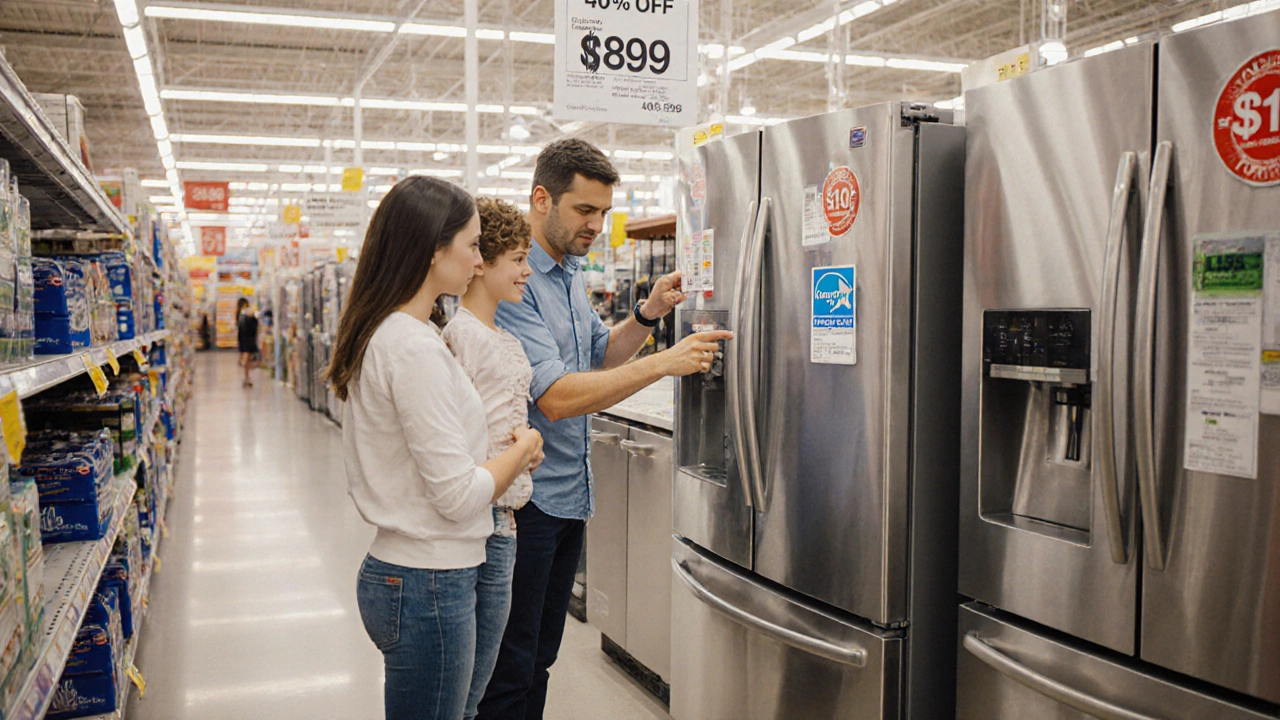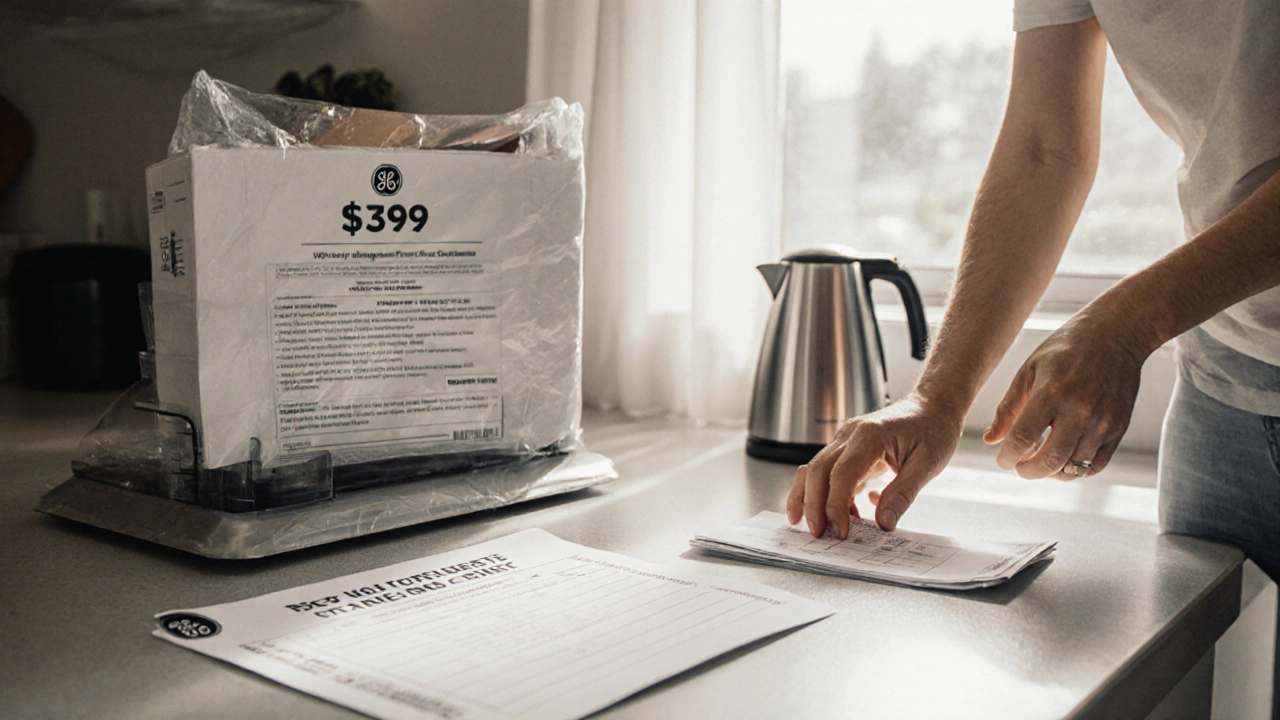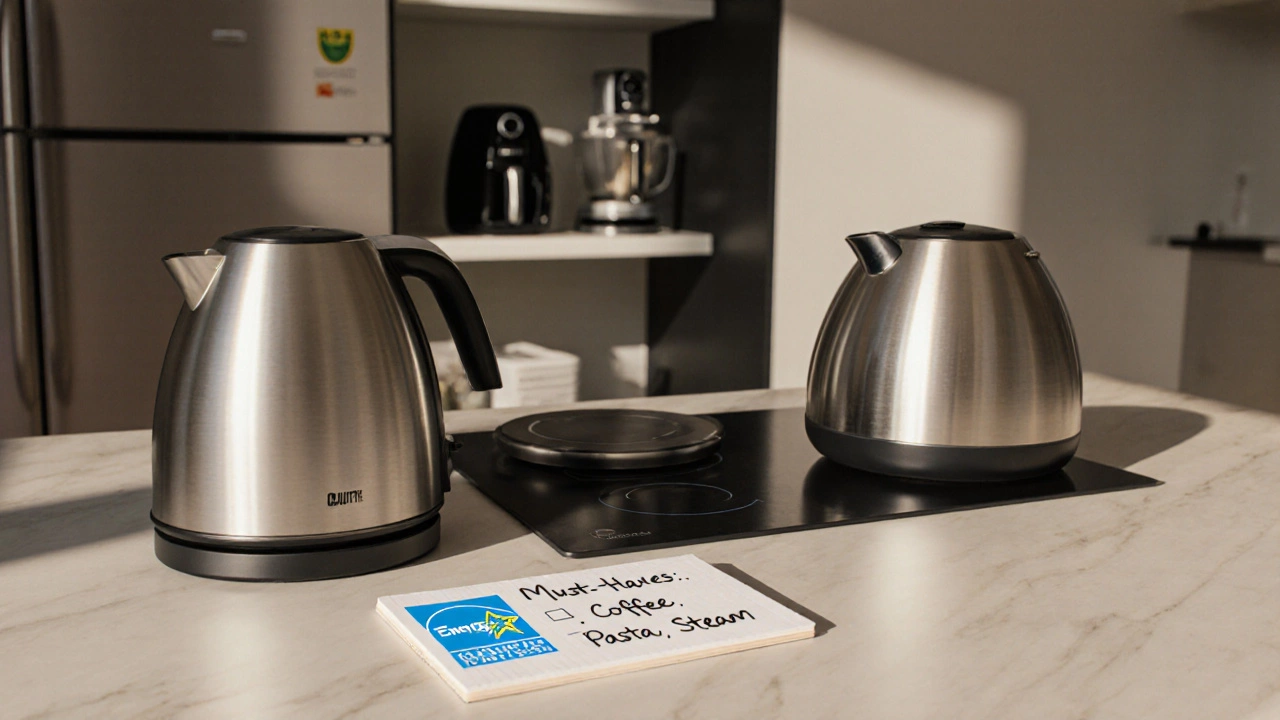Kitchen Budget Calculator
What's your kitchen budget?
Buying kitchen appliances on a budget doesn’t mean you have to settle for broken, noisy, or useless gadgets. In 2025, you can get reliable, energy-efficient appliances that last for years-even if you’re working with $500 instead of $2,000. The trick isn’t just waiting for sales. It’s knowing when to buy, where to look, and which bundles actually save you money.
Start with what you actually need
Most people walk into a store and buy five things they don’t use. A $120 air fryer sits unused because you never cook frozen food. A $200 stand mixer gathers dust because you bake once a year. Before you spend a dime, ask: What do I cook every week? If you make coffee daily, a $60 drip machine beats a $300 espresso system. If you steam veggies and boil pasta every night, a good electric kettle and a basic induction cooktop matter more than a fancy range. Make a list of three must-haves. Stick to it. Everything else is a bonus.Appliance bundles are the hidden goldmine
Retailers push bundles because they move inventory fast. And if you’re smart, you can save 20-40% compared to buying each item separately. The best bundles in 2025 are:- Refrigerator + freezer combo (ideal for small kitchens or meal preppers)
- Range + microwave + hood vent (perfect for renters or new homeowners)
- Dishwasher + garbage disposal + faucet (a kitchen remodel in one box)
- Blender + food processor + coffee maker (for coffee-and-meal-prep people)
Know the timing of sales
There’s a calendar to appliance deals-and it’s not random. Here’s when to strike:- January: New Year, new appliances. Stores clear out holiday inventory. Black Friday leftovers often reappear.
- May: Memorial Day sales. Big discounts on grills, outdoor fridges, and patio appliances.
- August: Back-to-school season. Kitchen upgrades sneak in as "family essentials".
- September-October: New models hit shelves. Old ones get slashed. Look for "Floor Model" tags.
- Black Friday/Cyber Monday: Still the biggest, but only if you’ve done your homework. Price-tracking tools like Honey or CamelCamelCamel show if a deal is real.
Buy refurbished-don’t be afraid
Refurbished doesn’t mean broken. It means someone returned it because they changed their mind, or it had a minor cosmetic flaw. Manufacturers like Bosch, KitchenAid, and Samsung refurbish these units with new parts, full testing, and a one-year warranty. Amazon Renewed, Best Buy Outlet, and Costco’s refurbished section all offer certified appliances with return policies. I bought a refurbished GE dishwasher in 2024 for $399. It’s quieter than my old $800 model. No leaks. No noise. Still works like new. Don’t skip the warranty. Always pick refurbished with at least a 90-day guarantee. If it’s not covered, walk away.
Skip the branded hype
A $1,200 Vitamix blender is great-if you make smoothies five times a day. But a $180 Ninja or Instant Pot Duo Crisp does 80% of the job for less than a third of the price. Same goes for toasters, kettles, and blenders. Here’s the truth: most kitchen appliances are made in the same factories. A $300 Kenmore blender and a $150 Ninja might use the same motor, the same blades, the same plastic casing. The only difference? The logo on the front. Check Consumer Reports’ reliability ratings. They test hundreds of models each year. In 2025, their top-rated budget blenders were all under $120. Their top-rated dishwashers? Brands like Frigidaire and Maytag-both under $600.Trade in your old stuff
Most big retailers will take your old appliance and give you credit. Best Buy offers up to $150 for a working fridge or washer. Home Depot gives $100 for a dishwasher. Even Costco has a trade-in program. You don’t need to haul it yourself. Many stores offer free pickup when you buy a new one. That $100 credit can be the difference between buying a full bundle or just one item.Think long-term, not just upfront cost
A $200 fridge that uses 800 kWh a year will cost you $120 in electricity over five years. A $400 Energy Star model that uses 450 kWh? You’ll save $60 in power bills alone-and it lasts longer. Look for the Energy Star label. It’s not marketing. It’s a federal standard. In Canada, Energy Star appliances use at least 15% less energy than standard models. Some use 40% less. That adds up. Also, check for rebates. BC Hydro and FortisBC offer up to $150 back for buying efficient fridges, dishwashers, or washing machines. You can combine that with store discounts. That’s free money.
What not to buy on a budget
Some things aren’t worth saving on:- Range hoods: Cheap ones are noisy and don’t vent properly. Mold builds up. Spend at least $200.
- Induction cooktops: If you’re buying a budget bundle, skip the standalone unit. Wait for a full range with induction built-in.
- Smart features: Wi-Fi-connected fridges that tell you when you’re out of milk? Useless. They break more often and cost $500 extra. Stick to manual controls.
Real example: How I built a full kitchen for $920
Last year, I replaced my 15-year-old kitchen with a $920 budget. Here’s how:- Refrigerator (refurbished, 18 cu ft): $320 (Costco)
- Dishwasher (floor model): $280 (Home Depot, $100 off trade-in)
- Induction cooktop + hood combo (bundle): $250 (Best Buy, August sale)
- Electric kettle + toaster: $70 (Walmart)
- Food processor: $100 (Amazon Renewed)
Final tip: Test before you buy
If you can, visit a store and open the fridge door. Listen to the compressor. Turn on the dishwasher. Feel the weight of the pots. A $150 blender that feels flimsy will break in six months. A $180 one that feels solid? It’ll last a decade. You don’t need to spend big to get good. You just need to know what matters-and what doesn’t.Are appliance bundles really cheaper?
Yes, if you buy the right ones. Bundles from major retailers like Best Buy, Home Depot, and Costco often save 20-40% compared to buying items separately. The key is comparing the bundle price to the sum of individual prices. Always check if the bundle includes models you actually want-some bundles mix low-end and mid-range items to make the deal look better.
What’s the best time of year to buy kitchen appliances?
Late August through October is the sweet spot. That’s when new models arrive, and stores discount last year’s stock. January and Black Friday also offer strong deals, but inventory is limited. For local deals in Canada, check retailer promotions around the third weekend of each month-many stores run regional sales then.
Is refurbished kitchen equipment safe to buy?
Absolutely-if it’s certified. Brands like Samsung, GE, and Whirlpool refurbish units with new parts, full testing, and a one-year warranty. Buy from trusted sellers like Amazon Renewed, Best Buy Outlet, or Costco’s refurbished section. Avoid third-party sellers on eBay or Facebook Marketplace unless they offer a return policy and proof of warranty.
Should I buy a smart fridge on a budget?
No. Smart fridges cost $1,000+ more than basic models and are prone to software glitches, Wi-Fi failures, and expensive repairs. A $500 fridge with a good seal and quiet compressor will outperform a $1,800 smart model in reliability and lifespan. Save the tech for your phone.
Can I get rebates for buying energy-efficient appliances in Canada?
Yes. In British Columbia, BC Hydro and FortisBC offer rebates up to $150 for Energy Star-certified refrigerators, dishwashers, and washing machines. Some municipalities add extra incentives. Check your utility provider’s website before buying-you can combine these with store discounts and trade-in credits.

